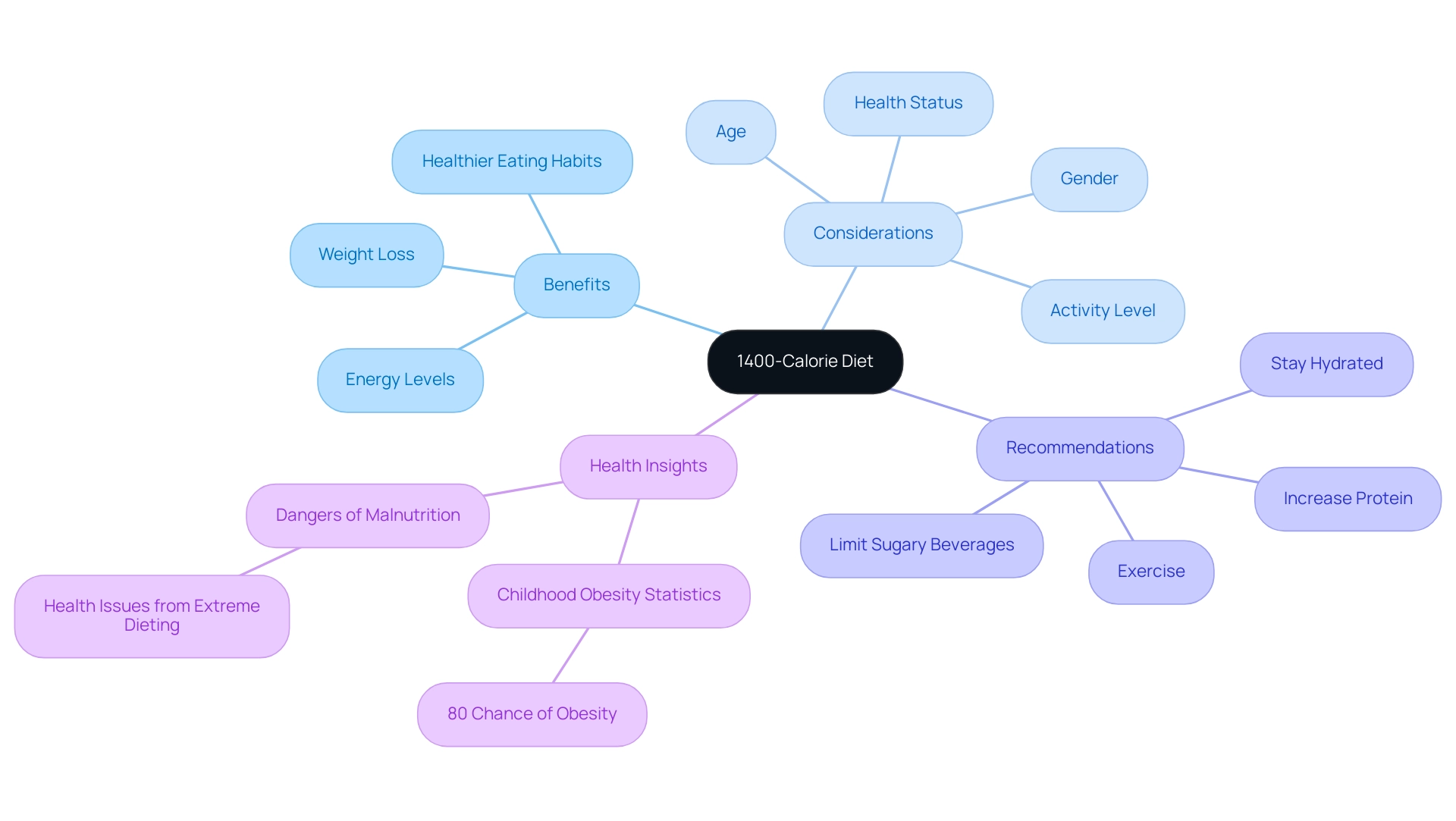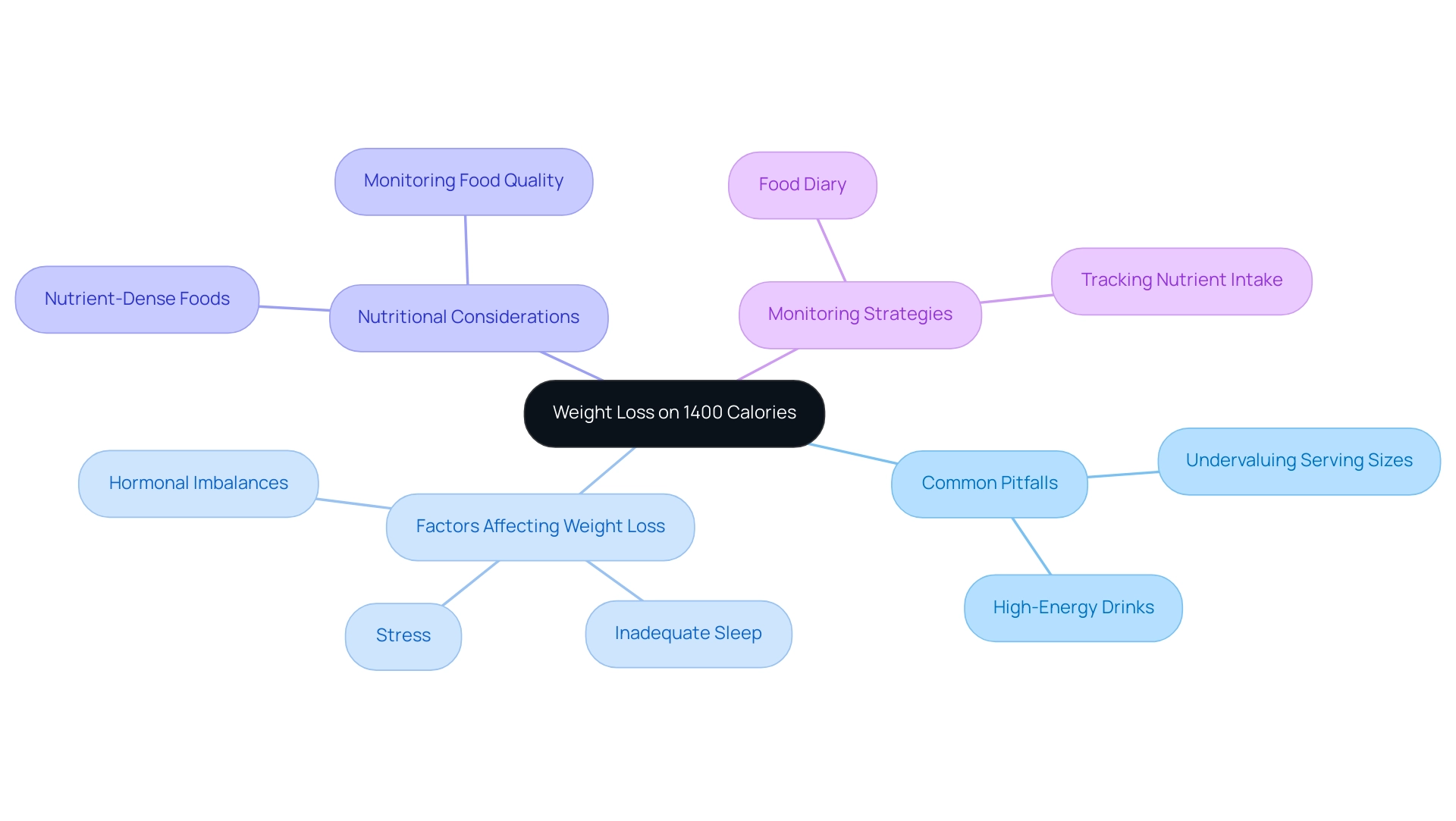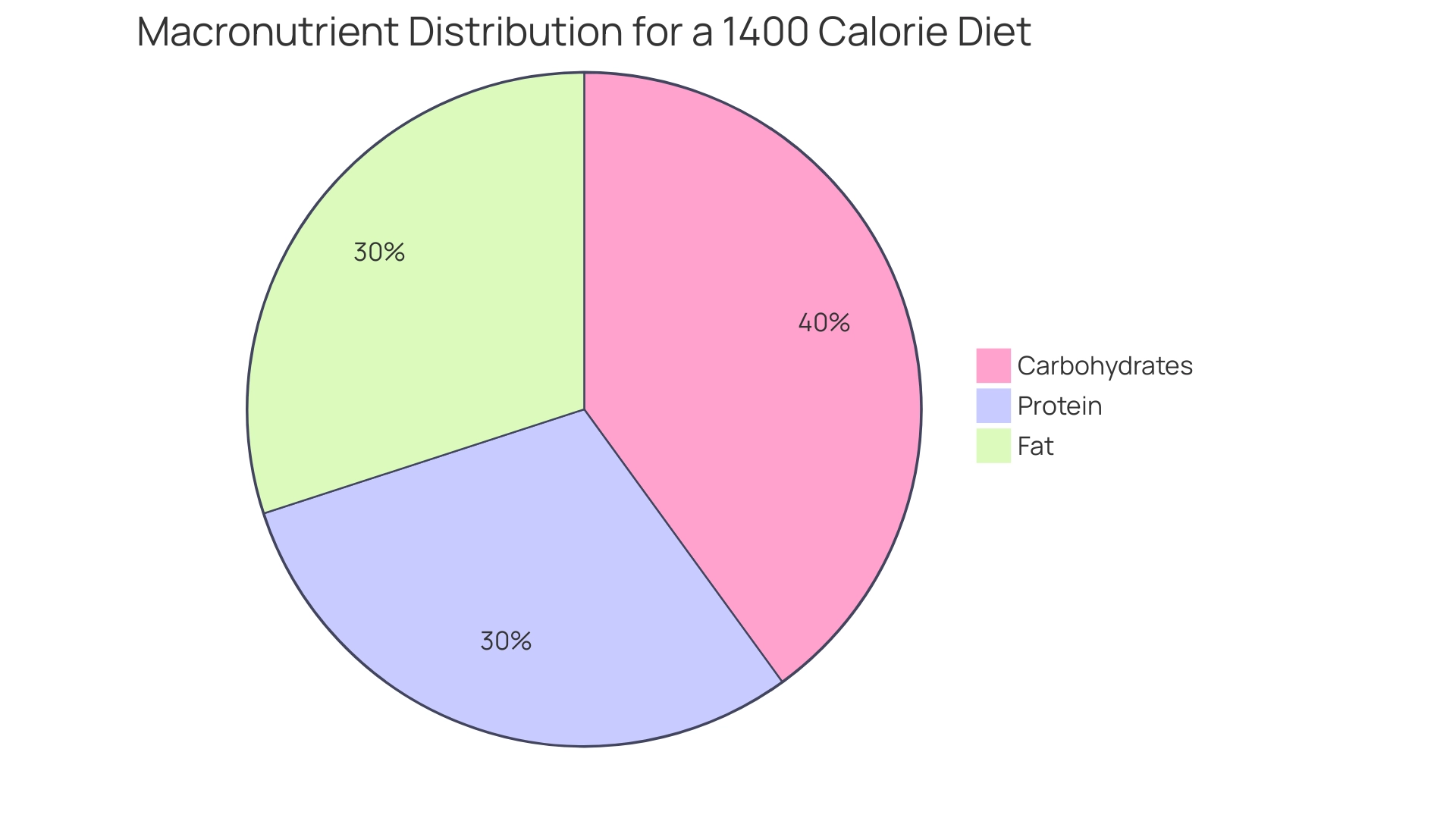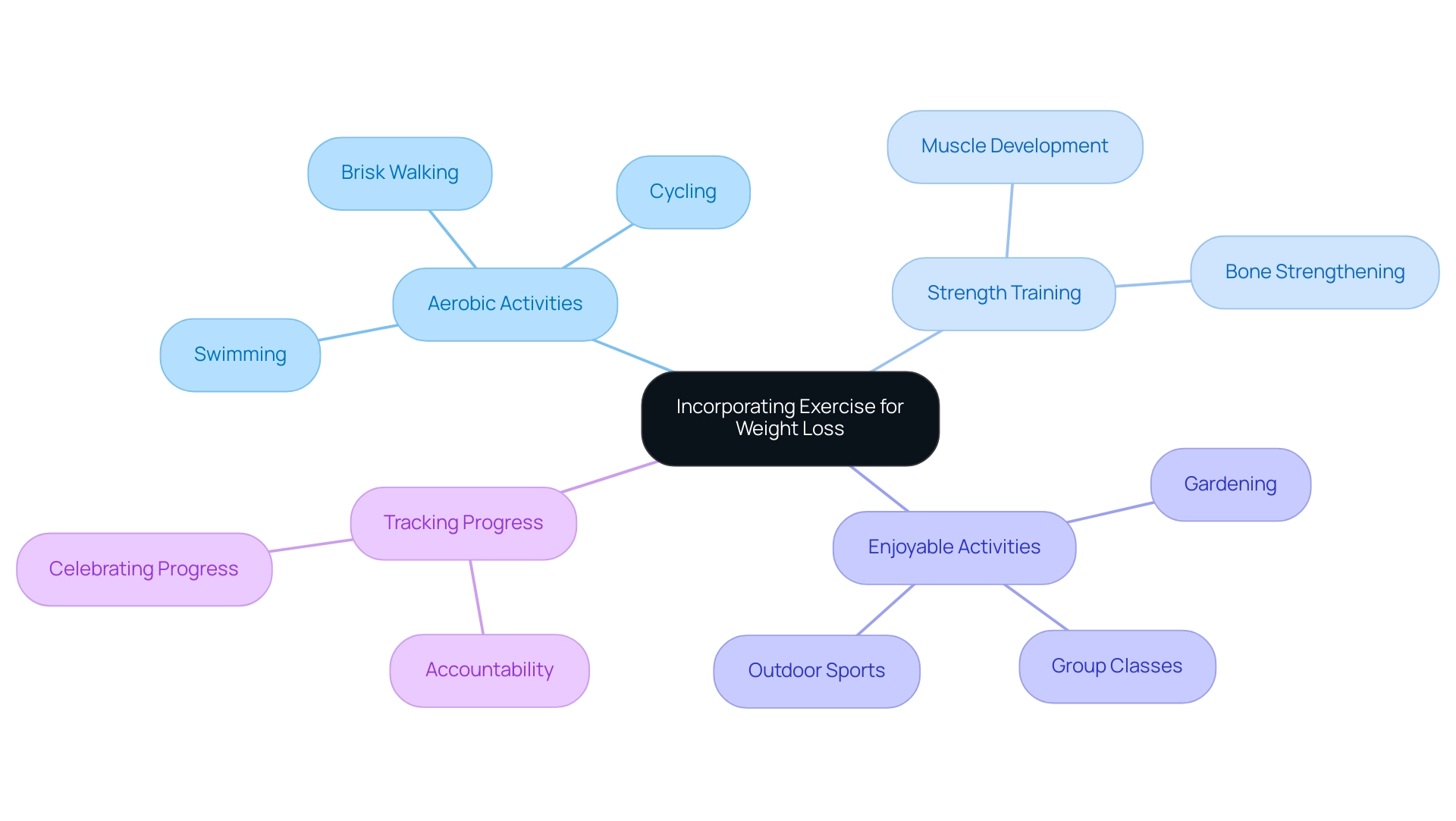Overview
The article addresses how to successfully lose weight on a 1400-calorie diet by emphasizing the importance of creating a calorie deficit while ensuring nutritional adequacy through balanced meal planning and incorporating exercise. It supports this by outlining effective strategies such as monitoring macronutrient distribution, addressing common pitfalls that hinder weight loss, and the necessity of tailoring the diet to individual needs, which collectively enhance the likelihood of achieving sustained weight loss.
Introduction
Navigating the world of dieting can often feel overwhelming, especially when attempting to adhere to a specific caloric limit like 1400 calories per day. This dietary approach, designed to create a calorie deficit, presents a myriad of benefits ranging from effective weight loss to improved energy levels and healthier eating habits. However, the journey is not without its challenges; individuals frequently encounter plateaus and setbacks that can derail their progress.
Understanding the intricacies of this diet—including common pitfalls, meal planning strategies, and the importance of macronutrient balance—can empower individuals to make informed choices that align with their weight loss goals. By exploring these essential elements, one can uncover the path to sustainable health and wellness while embracing the transformative power of a well-structured 1400-calorie diet.
Understanding the 1400-Calorie Diet: Basics and Benefits
A 1400-calorie meal plan is specifically created to produce a calorie deficit, a crucial element in achieving successful reduction. This dietary approach typically entails a reduction in daily caloric intake while ensuring that essential nutrients are still consumed. The advantages of adhering to this meal plan can be substantial, including effective weight loss, enhanced energy levels, and the answer to the question: can you lose weight on 1400 calories a day while cultivating healthier eating habits.
It is crucial to recognize that a 1400-calorie limit may not be appropriate for everyone. Factors such as age, gender, activity level, and overall health must be considered before embarking on this dietary path. Consulting with a healthcare professional or registered dietitian is highly advisable to tailor the diet to individual needs.
Eating more protein, exercising, staying hydrated, and limiting your intake of refined carbs and sugary beverages are simple ways to decrease your daily calorie intake.
This insight highlights the significance of a balanced method while seeking reduction, ensuring that nutritional adequacy is preserved to prevent health risks related to insufficient caloric intake. Moreover, it is crucial to acknowledge that children have about an 80% likelihood of becoming overweight if both parents are overweight, emphasizing the significance of tackling health issues early and the role of nutrition in prevention.
Additionally, the case study on the consequences of malnutrition illustrates the dangers of extreme dieting, reinforcing the necessity of adequate nutrition. Ultimately, the question of can you lose weight on 1400 calories a day highlights that reducing mass is a journey demanding time and consistency, where setbacks should be viewed as opportunities for growth.

Why Am I Not Losing Weight on 1400 Calories? Common Pitfalls
Many individuals face frustrating obstacles in reducing their body mass, leading to the question of whether you can lose weight on 1400 calories a day. The Minnesota Starvation Experiment, which involved 32 subjects undergoing 24 weeks of semistarvation, illustrates the potential consequences of energy intake limitation and how it can affect metabolism. One major factor in reaching a plateau in shedding pounds is the inclination to undervalue serving sizes, resulting in unintentional energy surplus.
High-energy drinks often go unnoticed, contributing hidden energy that disrupts weight loss efforts. Nutrient-dense foods should be prioritized, as they provide essential vitamins and minerals without excessive calories. Factors beyond diet, such as stress, inadequate sleep, and hormonal imbalances, can also hinder progress.
DMT asserts that "findings do not provide evidence in support of adaptive metabolic changes as an explanation for the tendency of individuals who have reduced body mass to regain mass," highlighting the complexities of shedding pounds. To address these challenges, it is vital to monitor not only food consumption but also the quality of what is eaten. The NHANES 1999–2004 data application offers insights into demographic factors affecting reduction, which can enhance understanding of plateaus in the context of can you lose weight on 1400 calories a day.
Maintaining a food diary can be a useful tool, as it enables individuals to identify hidden nutrients and gain insights into their eating patterns that may need adjustment. Dietitians emphasize that understanding these pitfalls is vital for overcoming weight loss plateaus and achieving lasting results.

Meal Planning for Success: Crafting Your 1400-Calorie Menu
Crafting a successful meal menu raises the question, can you lose weight on 1400 calories a day, and it begins with planning meals that encompass a diverse range of food groups. Aim to structure your day around three well-balanced meals and two nutritious snacks. For instance, a breakfast option could feature oatmeal topped with fresh berries and a small handful of nuts, providing a hearty start to the day.
For lunch, consider a vibrant salad incorporating lean proteins such as grilled chicken, complemented by a light vinaigrette dressing. As for dinner, a satisfying dish of baked salmon atop a bed of steamed vegetables and quinoa not only adheres to calorie guidelines but also offers a wealth of nutrients. To prepare the vegetables, bake them for 15 minutes at 400°F before adding the salmon fillets on top, ensuring they are cooked perfectly.
Additionally, you might try a light dish made with quinoa, various vegetables, black beans for protein, and a lemon-vinegar dressing, which aligns with the 1400-calorie plan. This recipe, known as 'Quinoa and Veggies,' offers a simple yet nutritious option for a meal. To streamline your meal prep, utilize meal prep containers to organize your meals for the week, ensuring healthy options are always at hand.
This proactive approach significantly reduces the temptation to deviate from your dietary goals. Remember, body transformation is a process that demands time and consistency; as Rebecca Jaspan, a registered dietitian, wisely advises, Speak with a registered dietitian for your individual nutrition needs and health goals. By incorporating these strategies, you can effectively maintain a balanced eating plan that supports your weight loss journey, raising the question: can you lose weight on 1400 calories a day?

Balancing Macronutrients: The Key to Effective Weight Loss
Achieving a well-balanced intake of macronutrients—proteins, fats, and carbohydrates—is fundamental for understanding if you can lose weight on 1400 calories a day. A widely endorsed macronutrient distribution suggests aiming for 40% carbohydrates, 30% protein, and 30% fat. For a daily intake of 1400 calories, this translates to approximately 560 calories from carbohydrates, 420 calories from protein, and 420 calories from fat.
To meet these targets, incorporate a variety of food sources:
- Lean proteins such as chicken, fish, and legumes
- Healthy fats like avocados, nuts, and olive oil
- Whole grains including brown rice and quinoa
This careful balance not only aids in reducing body mass—evidenced by the Portfolio diet's effects, which demonstrated a decrease of –0.8 kg to –1.2 kg—but also raises the question of whether you can lose weight on 1400 calories a day while playing a crucial role in maintaining muscle mass and sustaining energy levels throughout the day. Nutritionists stress that such macronutrient distribution is essential in creating sustainable dietary strategies that enhance long-term health and effective management.
At Foresight Health Coaching, our tailored programs provide clients with the personalized guidance and resources necessary to implement these dietary strategies safely and effectively. Our approach ensures that individuals and corporate members alike receive comprehensive support on their wellness journeys, ultimately enhancing the overall health and productivity of employees. We offer competitive pricing for our corporate memberships, which can accommodate up to 30 employees, with the flexibility to adjust for additional members.
Individual coaching services are also available, designed specifically for high-performing individuals, including athletes. What sets Foresight apart is our commitment to personalized coaching and the integration of our exclusive health and wellness app, which fosters community and support among clients. This holistic approach to health coaching not only addresses dietary needs but also empowers clients to achieve sustainable health improvements.

Incorporating Exercise: Boosting Your Weight Loss Journey
Incorporating regular exercise into your daily routine can significantly improve fat reduction efforts while promoting overall health. Current guidelines recommend aiming for at least 150 minutes of moderate-intensity aerobic activity each week, which can include activities such as:
- Brisk walking
- Cycling
- Swimming
Alongside aerobic exercise, including strength training at least two days a week is crucial for developing muscle mass, which can enhance metabolism and aid in reducing body fat.
Engaging in activities you enjoy, such as:
- Group classes
- Outdoor sports
- Gardening
can improve adherence to your exercise plan. Notably, recent insights from fitness experts underscore that even small amounts of physical activity can yield significant health benefits. For instance, the case study 'A Little Means A Lot' demonstrates that starting with manageable goals and gradually increasing activity can lead to substantial health improvements, regardless of previous activity levels.
Furthermore, the Mayo Clinic Staff emphasizes that due to changes in the body over time, you might wonder, can you lose weight on 1400 calories a day by cutting calories more as you age to continue losing pounds or to maintain the same level. Tracking your physical activity not only fosters accountability but also allows you to celebrate your progress, reinforcing positive behaviors on your weight loss journey.

Conclusion
Successfully navigating a 1400-calorie diet involves understanding its foundational principles, potential pitfalls, and effective strategies for sustained weight loss. By recognizing the importance of creating a calorie deficit while ensuring nutritional adequacy, individuals can reap benefits such as enhanced energy levels and healthier eating habits. It is essential to approach this diet with a balanced mindset, focusing on:
- Portion control
- Nutrient-dense foods
- The significance of macronutrient distribution
Addressing common challenges such as:
- Weight loss plateaus
- The underestimation of calorie intake
is crucial. Tracking food consumption and engaging with a registered dietitian can help identify hidden pitfalls and facilitate informed dietary choices. Moreover, incorporating regular exercise not only boosts weight loss efforts but also enhances overall well-being, emphasizing the interconnectedness of diet and physical activity.
Ultimately, embracing a structured 1400-calorie diet, complemented by thoughtful meal planning and exercise, can lead to sustainable health improvements. As individuals embark on this journey, it is vital to remain patient and committed, recognizing that setbacks are opportunities for growth. With the right tools and knowledge, achieving lasting weight loss and improved health is within reach.




